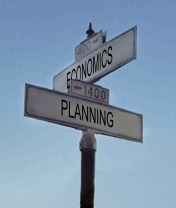On October 30 of this year the Stern Review on the Economics of Climate Change was released. The team that wrote the report was headed by Sir Nicholas Stern, Head of the Government Economics Service and Chief Economist for the World Bank from 2000 to 2003. In the report the costs of global warming were weighed against the costs of mitigating the affects of global warming. In other words, the report the team sought to determine if fixing global warming made economic sense. Three different methods were used to determine the economic impact of global warming and all three found that "the benefits of strong, early action considerably outweigh the costs." In other words, fixing global warming is good for the global economy.
The report suggests that global warming "is the greatest and widest ranging market failure ever seen." While global warming will negatively affect the global economy, the effects will not be evenly distributed. Unfortunately those countries already struggling will be hardest hit. This is especially unfair since global warming is a phenomenon created by the richer industrialized countries of the world. This is just another instance of the poor getting poorer. While the poor will be hardest hit the developing nations will also be hurt by global warming. The report states that the effects of global warming will put the global economy into a depression similar to the one experienced in the 1920's.
So what does this all have to do with cities? Well, everything. Since the industrial revolution the economies of scale found in cities have produced sprawling metropolises. Most of greenhouse gas emissions produced in the last century can be linked to cities and their growth. Emissions from industry was the main sources of emissions at the start of the century, but soon the effects of cars and massive amount of energy needed to keep a city operating also began to have a toll on the global climate as well. Cities put a double whammy on the global climate by destroying habitats that helps to reduce greenhouse gases while also producing massive about of greenhouse gases at the same time.
The problem is not going to go away, no more than cities are going away. In fact more and more people are flocking to cities across the globe. So while the problem of global warming began and continues to be with modern cities the solution can be found in cities as well. Cities have to be part of the solution in order for any mitigation measures to work. This does not mean that cities must "bite the bullet" or "take one" for the global cause. There are a variety of ways in which cities can do their part in reducing their greenhouse emissions while also making the city a better place to live. Many of the newest urban design theories call for a return to more human scale, walkable development. These New Urbanist and sustainable design gurus suggest that new forms of development make social, economic and environmental sense. Many of these energy saving measures, such as public transit and more dense walkable neighborhoods, area also seen as amenities by young educated workers, seen by many to be the economic drivers of the new information based economy. So cities that address global warming can do so in a way that increased the overall quality of life for their residents. There is also plenty of money to be made in mitigation effort. Cities that are able create markets and encourage entrepreneurs creating solutions to global warming will be economic winners in the next century. Solving global warming makes economic sense for the global economy and for cities as well.
Subscribe to:
Post Comments (Atom)

1 comment:
I just came across this article about saving New York from flooding caused by global warming. I thought it worth linking to since it looks like people are already thinking about the expensive projects it is going to take to deal with global warming.
Post a Comment